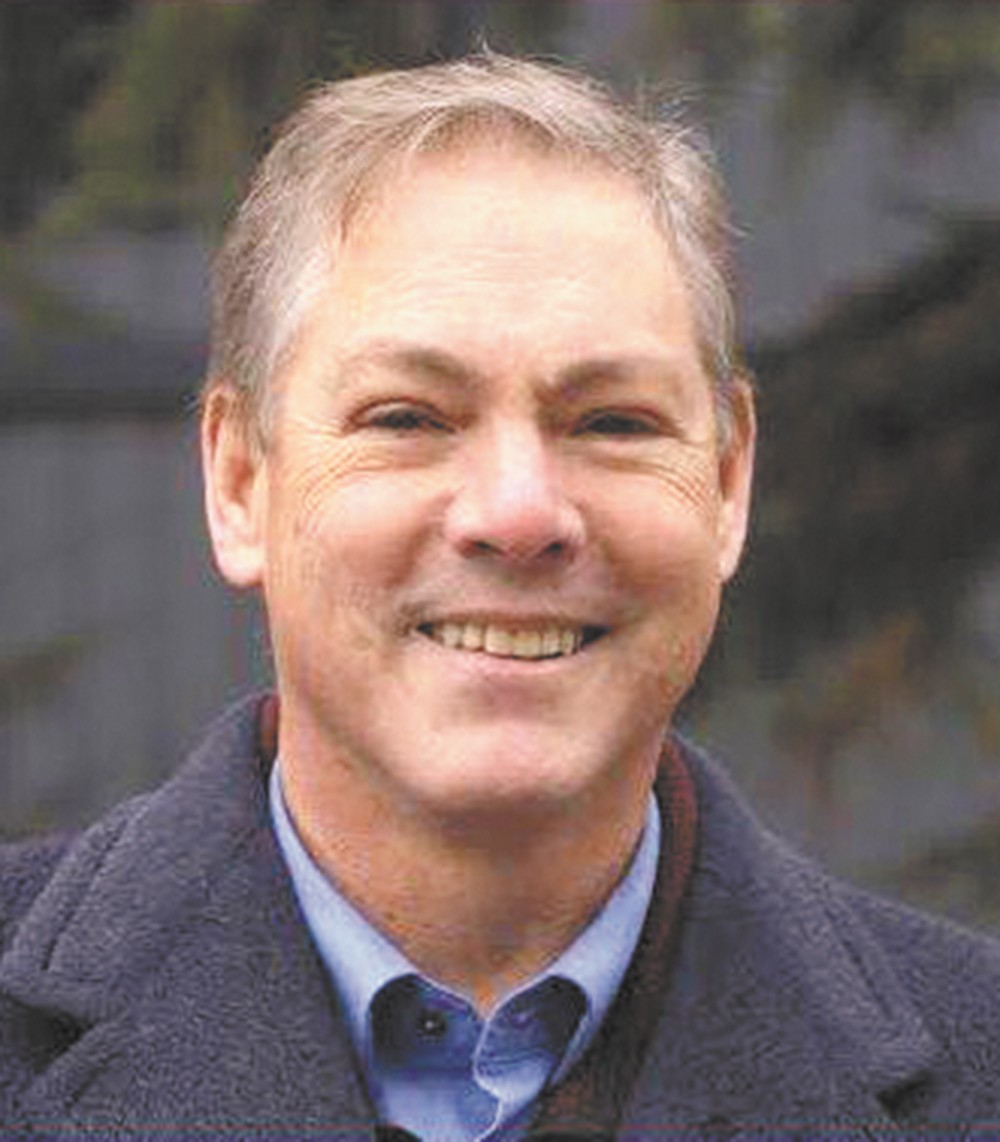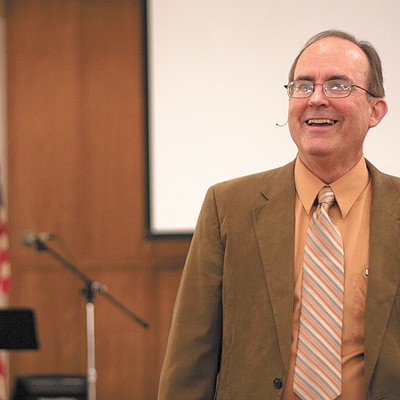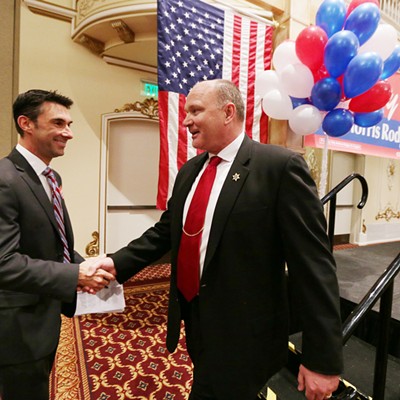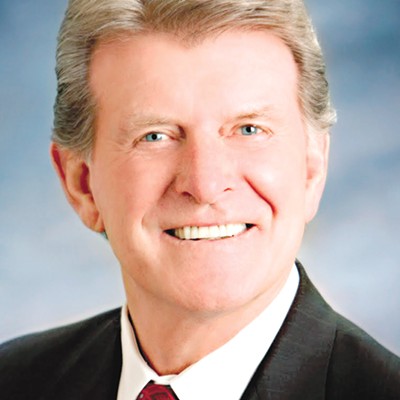Former Spokane Valley Mayor Diana Wilhite and kindergarten teacher Bob McCaslin, Jr. (son of the late state Sen. Bob McCaslin) agree on most issues. And the occasional difference — both oppose abortion, but Wilhite makes exceptions in rare cases, like rape — are unlikely to have a legislative impact in a socially liberal state like Washington.
Yet that distinction on abortion highlights a difference — their flexibility — reflected in a variety of other issues. McCaslin, for example, has signed a pledge that he won't raise taxes or fees. Wilhite hasn't.
"I don't think you can carte blanche predict what may come before you," she says.
She supports more transportation funding, though she doesn't necessarily think a higher gas tax is the answer.
McCaslin, by contrast, says the transportation budget is being spent incorrectly. He believes it's possible to cut more taxes by targeting waste and fraud. McCaslin does say there may be one reason to raise more revenue: funding mental health. "I don't consider it 'raising taxes' if you're saving billions of dollars in a four- or five-year period," he says.
Candidate Q&A
If elected, what will you work to accomplish in the Legislature next session?
Diana Wilhite (Republican): First the state needs to learn to live within the revenues received just like I had to do when running our small business. There needs to be changes made in how programs are funded and whether they are providing the best benefits to the citizens. As a small business owner for over 30 years, I would also like to facilitate changes in the Department of [Labor and Industries] that would reduce the costs but still provide benefits for those injured workers. And changes need to be made in the allocation of dollars to the transportation budget.
Bob McCaslin (Republican): My legislative priorities are: government reform, jobs and the economy, and education.
The Legislature is obligated under the state Supreme Court to fully fund K-12 education by 2018. How can the Legislature keep good on this promise while facing a projected budget shortfall? Would you support any plans for increasing the state’s revenue?
Wilhite (R): In order for the Legislature to meet the McCleary decision, the state will have to repriortize its spending.
McCaslin (R): The state Supreme Court over-reached its function as a branch of government when it dictated to the legislature how much it needs to spend on public education. The legislature spent more on education in the last budget year than it ever did before — education presently takes up approximately $9 billion of the state budget per year to educate 1 million students. Only 59 cents per dollar actually reaches the classroom in our state, and we rank 28th money spent per student, a little over $9500 when adjusted for inflation. We need to take a hard look at where all of the $9 billion is going, and be sure it is helping students directly to do better. If there is a need for more or new revenue, we need to look at more sustainable sources for funding, so that we are not at the whim of the economy to follow what our state constitution tells us to do — fund public education. Over 30 other states in the nation have gotten control over their public lands to fund education, and they do it well.
Without additional sources of revenue, state agencies will be forced to cut funding to balance the 2015-17 budget. In your opinion, which programs and services can afford these budget reductions? On the other hand, which programs and services would you strive to protect from these cuts?
Wilhite (R): As I have not yet had an opportunity to look at ALL the programs and services that the Legislature funds, I do not know which state agencies would require a reduction in funding nor which ones that would not require any budget cuts.
McCaslin (R): I think almost every state agency could spend less. Our state government is too big. I would start with allowing state agencies to carry over budget surpluses, so they are not forced to “spend it or lose it” at the end of every fiscal year. The state in turn saves money, and those agencies that proved they can run a tight ship should get priority in funding the following year. Under Governor Gregoire, over 6000 state employees were hired, and when there was a budget shortfall, the result was just a hiring freeze- no business could afford to operate like that.
Would you support Gov. Inslee’s proposed carbon emissions tax and/or cap-and-trade system? If not, what, if anything, should Washington do to cut greenhouse gas emissions in order meet the carbon-emissions reduction targets set by the Legislature in 2008?
Wilhite (R): I do not support the Governor's proposed carbon emissions tax and cap and trade system. Both of these policies combined will make it more expensive to reduce carbon emission while doing nothing to increase reductions. This would require everyone to meet the same carbon reduction goal without any flexibility.
McCaslin (R): I do not support Gov. Inslee’s plans for carbon emission taxes and cap and trade. Any environmental policies that are more strict than the federal government’s standards have to be based on hard science instead of feel-good policies that hurt our state economy. We must not act on these things; there are more important issues facing the State.
As Washington faces a looming doctor shortage, Washington State University is asking the Legislature for $2.5 million to establish its own medical school. Would you support this request from WSU? If not, what’s your plan for filling this growing need in our health care industry?
Wilhite (R): WSU will have to make their case as to why they should have their own medical school. I would want to hear what the University of Washington is planning on doing with regard to the WWAMI program.
McCaslin (R): I support a medical school at Washington State University- we’ll have to take a good look at where the funding will come from- I am hoping that we can get rid of some of the business-killing regulations in our state, so that more businesses can thrive, and hopefully more businesses can start up, because we have a more business-friendly environment. More successful businesses equal more revenue for the state!
As the recreational marijuana industry continues to grow, what reforms would you support to the medical and/or recreational markets?
Wilhite (R): The Liquor Control Board has spent months and months on what regulations to have with regard to recreational and medical marijuana. We need to see what is working and then determine what needs to be changed.
McCaslin (R): As the marijuana market grows, the black market for it grows even more. The cost of illegal marijuana is less than the legal kind, so we have to look at the price of enforcement as part of the equation. I was not in favor of legalizing marijuana because of how it would increase use of it by minors. Our public schools in Spokane have seen a marked increase of pot being present on campus because of parental use — a consequence that many supporters of the Initiative failed to predict.
After accepting $8.7 billion in tax breaks, Boeing recently announced it will move 2,000 jobs to Oklahoma City and St. Louis. What incentives should Washington offer to big businesses to keep them from moving jobs out of state?
Wilhite (R): Whatever incentives are offered to any business should be tied to keeping and increasing job positions in Washington State.
McCaslin (R): I think our state needs to take a hard look at how we regulate businesses. I think Boeing is sending jobs elsewhere at least partly because of this. Also, why haven’t we asked for promises in return for these tax breaks? That’s a serious issue that needs to be addressed. My experience with businesses go way back to my parents running their own real estate business here in the Spokane Valley. I saw first hand how managing employees and paying taxes affected their ability to provide for our family.
Here at the Inlander, we’ve written extensively about the cracks in our mental health system. Our stories have touched on the burden of mental illness on the criminal justice system, punitive conditions at Eastern State Hospital, psychiatric boarding, and the difficulty of getting care in rural areas. What specific steps would you support to improve mental health care in Washington?
Wilhite (R): There are no easy answers to this question of mental health care, therefore I would need to talk with the professionals in this field to ascertain what suggestions they would offer.
McCaslin (R): I have signed a no new taxes or increases of taxes pledge as part of my campaign platform. That said, we have to look at the long-term effects of not investing in effective mental health programs that help people. If we don’t invest now, we’ll pay for that many times over down the road. An increase in spending for mental health in Washington now will save us billions in taxes in the future. What makes me qualified to speak on this? I worked for both the state Department of Disabilities and the Department of Social Health Services during the 1990s. I saw our mental health system first-hand, and know it needs our attention desperately. Attracting people who have proven, successful experience in these areas is the first step. The second is to do a veritable cleaning-of-the house dealing with mental health and criminal justice. I am sure both Larry Haskell [candidate for Spokane County prosecutor] and Ozzie Knezovich and the county sheriff’s department would work with the legislature to come up with a workable plan.



























